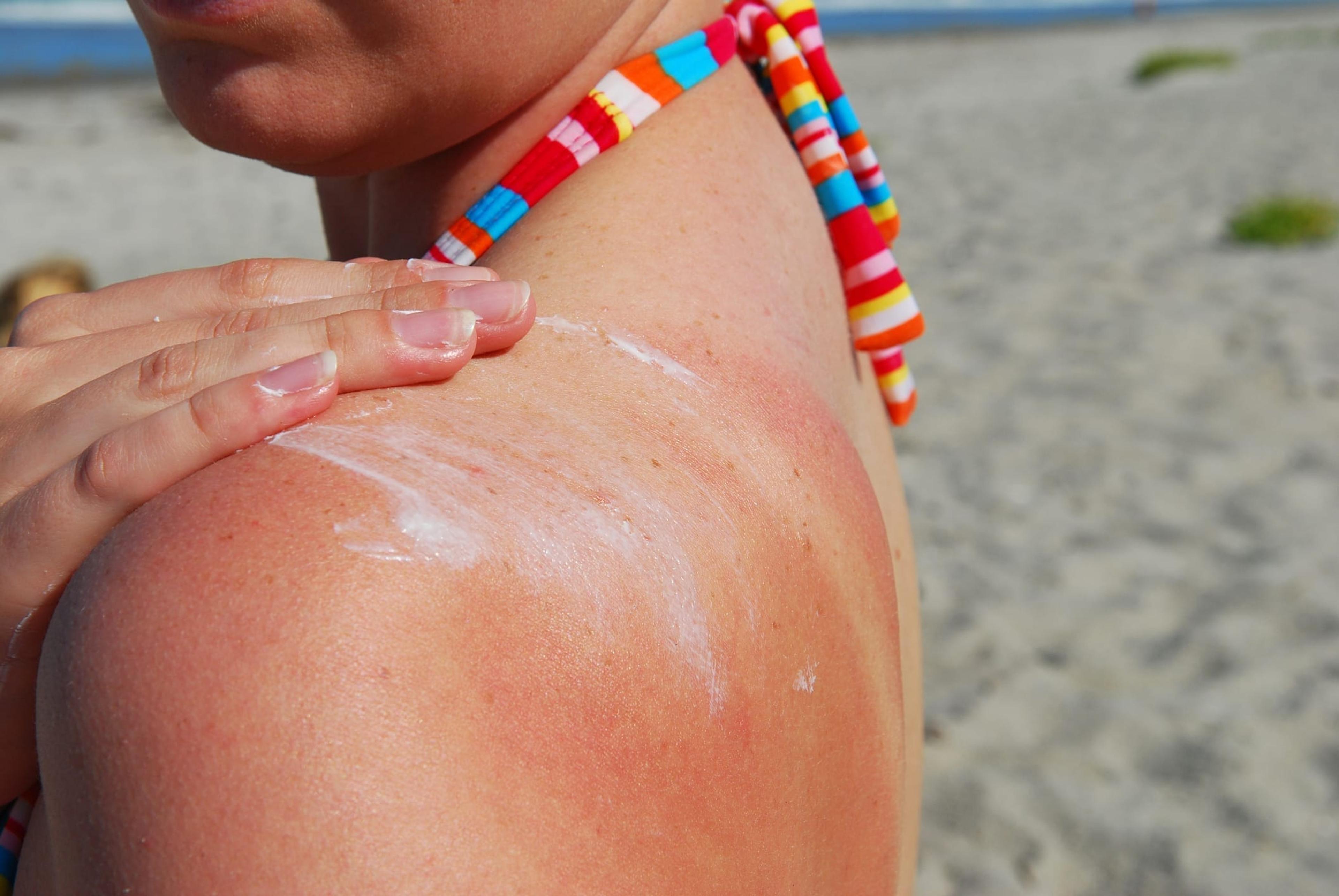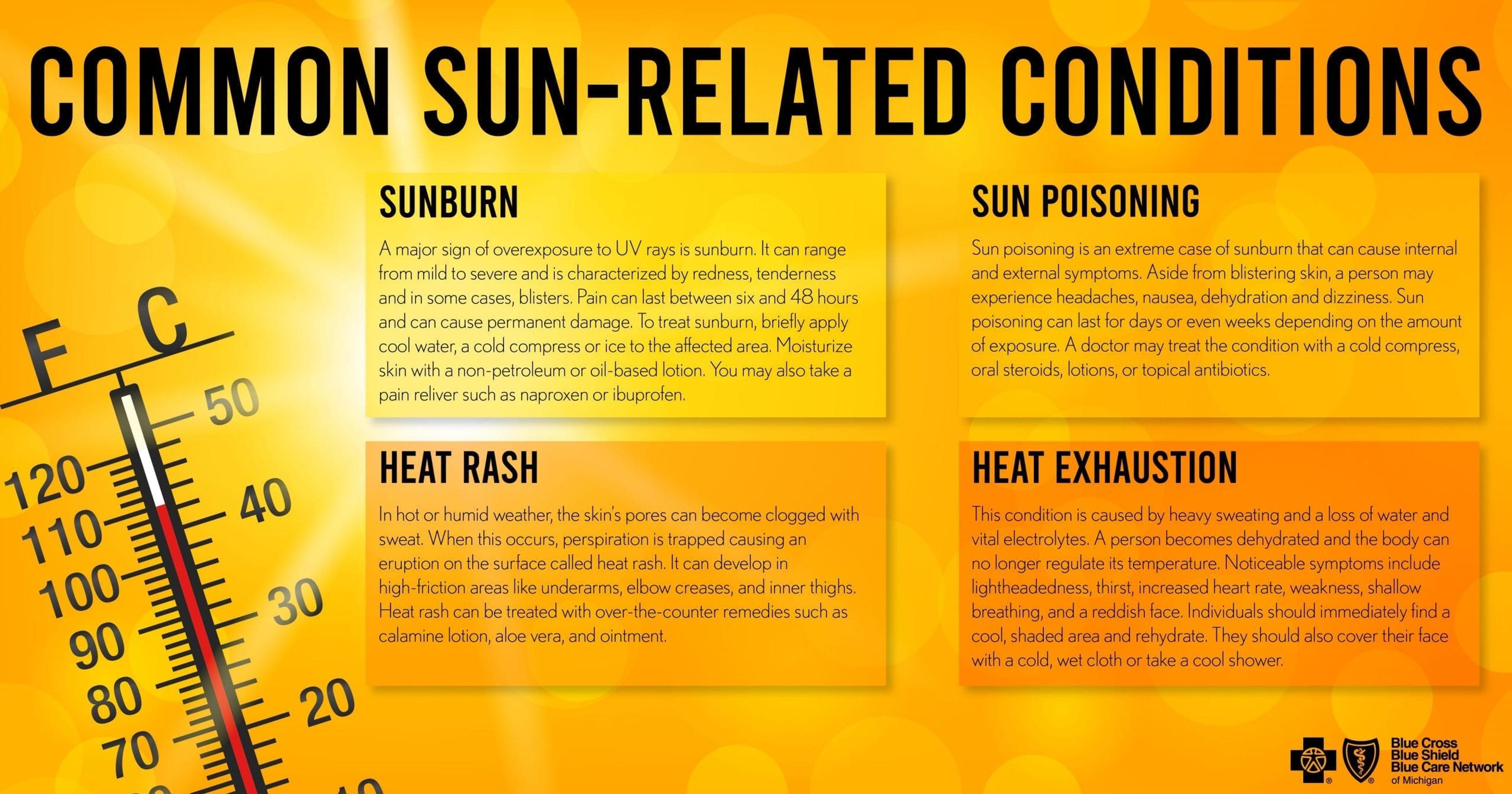Differences Between Sunburn, Sun Poisoning, Heat Rash, Heat Exhaustion

Blue Daily
| 3 min read

The sun is big and beautiful, but it’s also dangerous. It emits powerful ultraviolet (UV) radiation that can severely damage one’s skin, hair and body. Excessive exposure to harmful rays is linked to multiple diseases such as cancer. Heat from the sun can lead to heat-related illnesses that can be life-threatening.
Here are four common sun-related conditions and how to treat them:
Sunburn
A major sign of overexposure to UV rays is sunburn. It can range from mild to severe and is characterized by redness, tenderness and in some cases, blisters. Pain can last between six and 48 hours. Sunburn can cause permanent skin damage and increase risk of skin cancer, according to the Skin Cancer Foundation.
To treat sunburn, take a cool shower or apply a cold compress to the affected area. Moisturize your skin with a non-petroleum or oil-based lotion or aloe vera. You may also take a pain reliver such as naproxen or ibuprofen. Drink plenty of water to rehydrate.
Sun Poisoning
Sun poisoning isn't a medical condition, but is a term for an extreme case of sunburn that can cause internal and external symptoms, according to the Cleveland Clinic. Aside from blistering skin, a person may experience chills, headaches, nausea, dehydration and dizziness. The dizziness and nausea are from dehydration rather than the sunburn.
Like with sunburn, treat sun poisoning with a cold compress, oral steroids, lotions, topical antibiotics and drinking plenty of water. Talk to you primary care provider if the sunburn shows signs of infection such as bleeding or oozing.
Heat Rash
In hot or humid weather, the skin’s pores can become clogged with sweat. When this occurs, perspiration is trapped causing an eruption on the surface called heat rash, according to the Mayo Clinic. It can develop in high-friction areas like underarms, elbow creases and inner thighs. Heat rash can be itchy, but it is generally not a serious condition unless the skin becomes infected.
Heat rash usually goes away ones the skin cools. Apply a cool compress, avoid the sun, keep your skin clean and wear loose clothing.
Heat Exhaustion
This condition is the most common heat-related illness, according to the Cleveland Clinic. You can get heat exhaustion from overexertion in hot weather. When overheated, the body can no longer regulate its temperature.
Symptoms include:
- Lightheadedness
- Muscle cramps
- Thirst
- Increased heart rate
- Weakness
- Shallow breathing
- A red face
If you have these symptoms, immediately find a cool, shaded area and rehydrate. You can also cover your face with a cold, wet cloth or take a cool shower. Left untreated, heat exhaustion can become heat stroke, which can be life-threatening and requires immediate medical attention.

How to protect yourself from the sun
It only takes 15 minutes for skin to be damaged by UV radiation. Monitor for pinkish discoloration, as it can be an early sign of sunburn or sun poisoning. Also watch out for fatigue, dizziness, dry mouth and less-frequent urination, which can be symptoms of dehydration or other heat-related illnesses.
Always wear sunscreen, a protective lotion that absorbs and reflects UV rays. For ample coverage, choose broad-spectrum SPF 15 or higher. Sunscreen wears off and must be reapplied every two hours, as well as after swimming, sweating or towel drying.
Protective clothing also provides protection against UV rays. Hats, long-sleeve shirts, neck gaiters and swimsuits with ultraviolet protection factor (UPF) in addition to sunscreen will help you stay safe from the sun.
While spending time in the heat, drink plenty of water and take regular breaks to prevent heat-related illnesses. Avoid exercising or doing labor on excessively hot days, and exercise indoors or early in the morning or late in the day.
Photo Credit: Getty Images
Read more:





